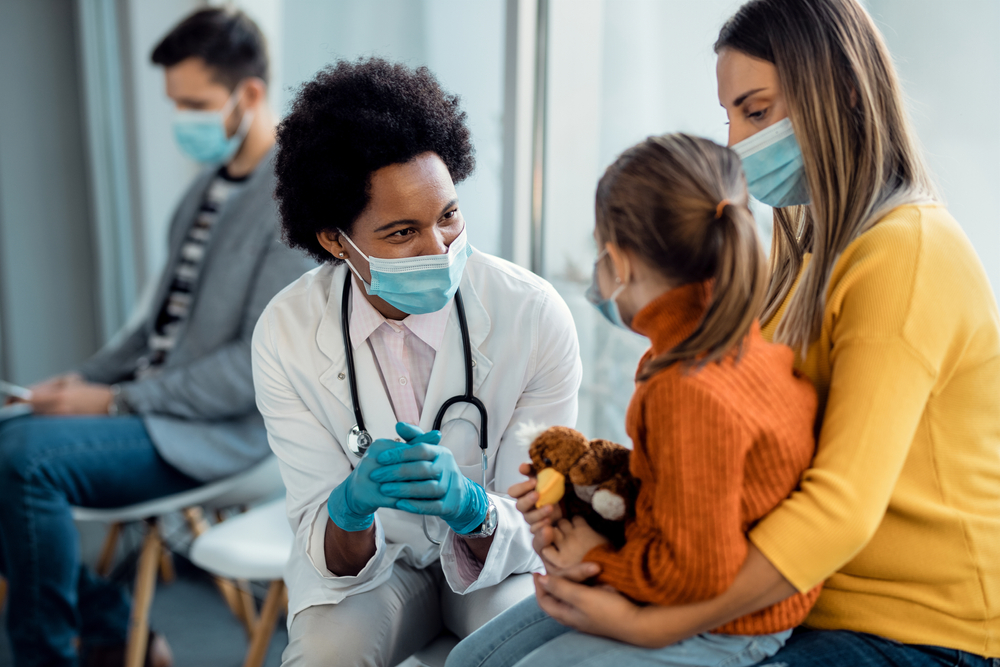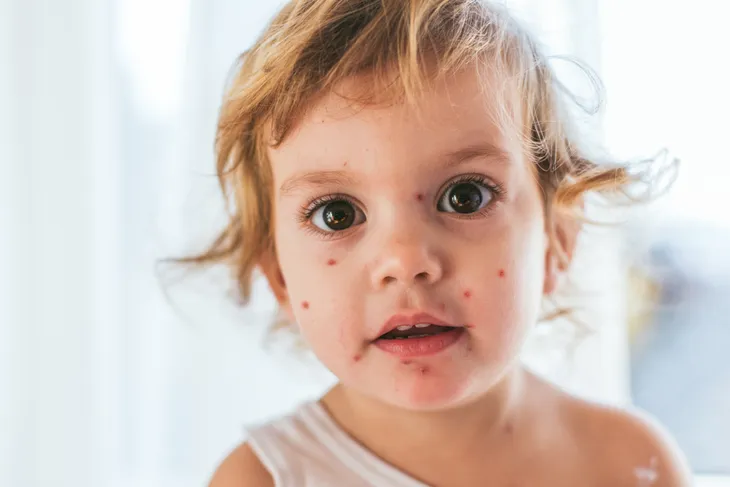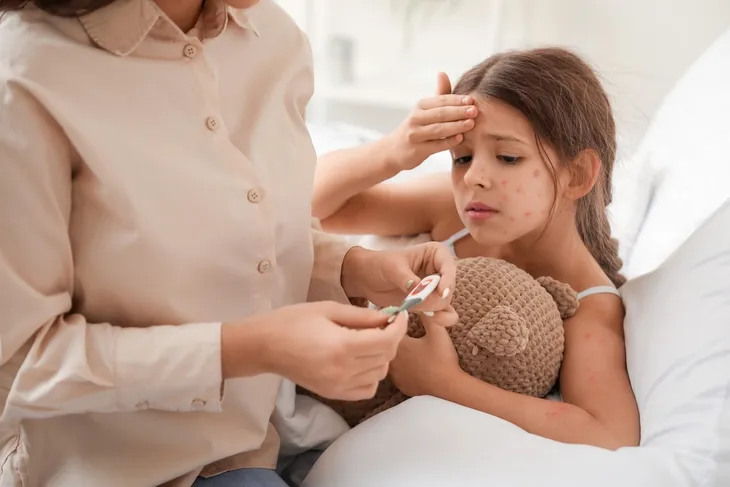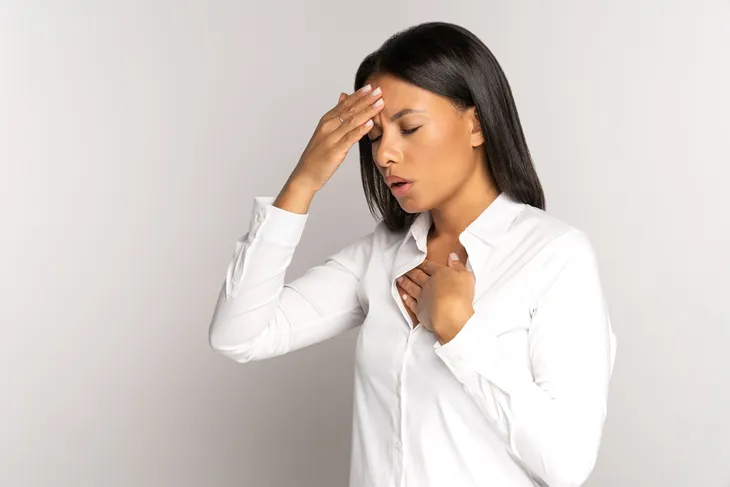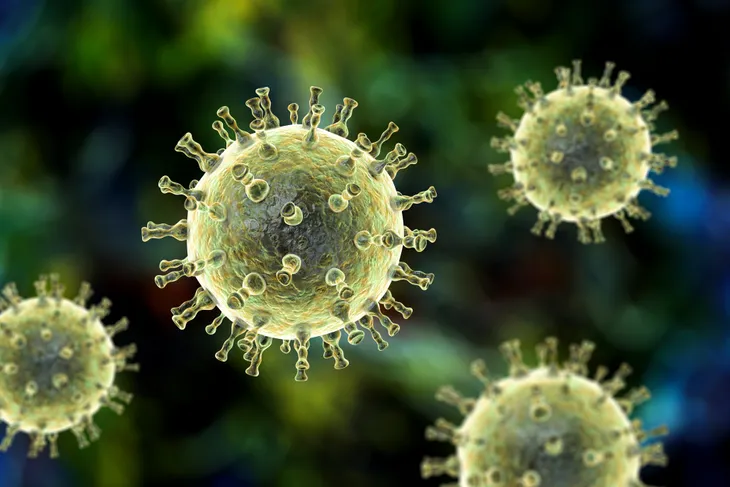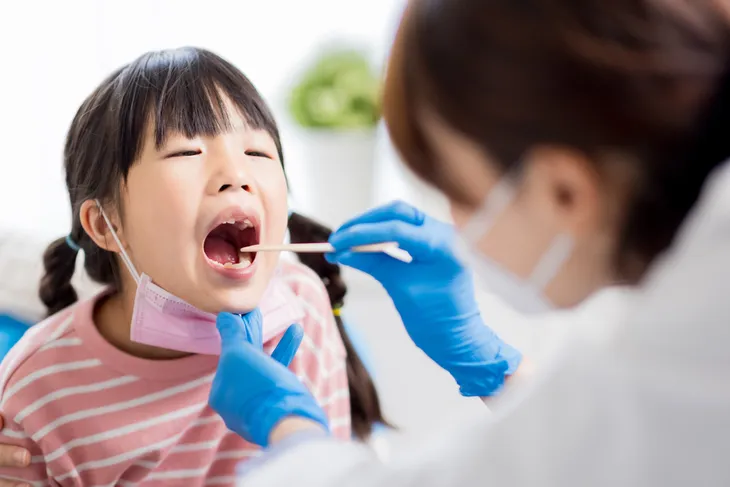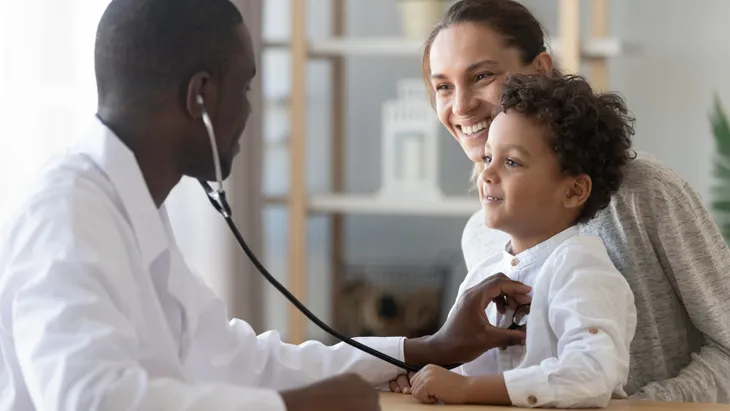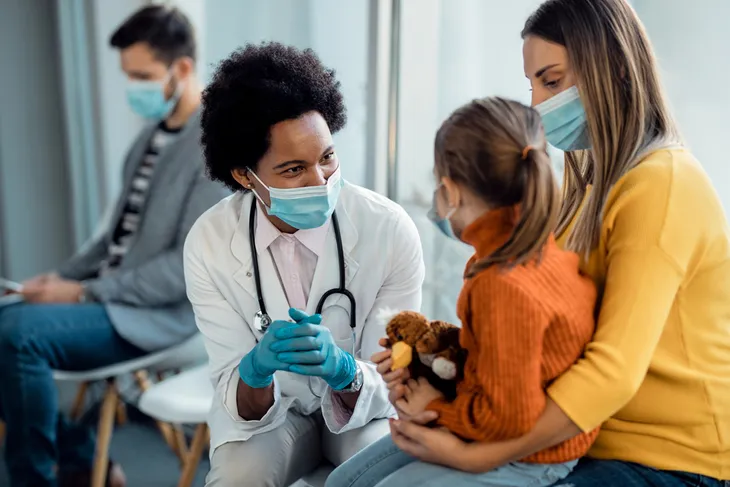Chickenpox, also called varicella, is a viral infection that causes an itchy red-spotted rash, which produces blisters that eventually scab over. The rash typically starts on the face and abdomen and then spreads throughout the body. The infection is also extremely contagious, so it’s important to get informed. Luckily, a vaccine was introduced in the mid-1990s and has caused cases to decline. That said, it’s still important to know the signs and what to do if you or your child develops it.
Common Symptoms of Chickenpox
Chickenpox is most commonly known for the red spots it produces. Those red spots actually start out as blisters and then eventually scab over. The itchy rash is the telltale sign of chickenpox but according to Healthline, it can also cause other symptoms too, such as loss of appetite, headache, and even fever.
The source says the infection is in your body for about 21-days before the rash even develops. Chickenpox is also highly contagious to unvaccinated individuals. You’ll start to be contagious up to 48-hours before the rash even occurs.
The Phases of the Rash
Before you recover, the rash will go through three phases. The first phase involves the development of red or pink bumps. Spots often start to develop on the face and trunk and then spread to the rest of the body. In the second phase, the bumps become fluid-filled blisters, which leak. Finally, in the third phase, the blisters begin to scab over, which starts the healing process.
Healthline points out that the bumps won’t all be in the same phase at the same time. “New bumps will continuously appear throughout your infection,” explains the source. You’re contagious until all the blisters on your body scab over. Eventually, the scabs will fall off. It typically takes 7- to 14-days for the spots to go away completely.
Common Symptoms of Chickenpox in Adults
Chickenpox is most common in young children, however, adults can become infected too, especially if they’re unvaccinated and didn’t get the infection as a child. While symptoms in adults can be similar to symptoms in children, they can also be more severe. Medical News Today says adults who are unvaccinated or immunocompromised are especially at risk.
The source says some adults may not develop a rash or if they do, it may not spread in the same way. In adults, the rash can also leave deeper marks and scars. The source also notes adults have a greater risk of developing complications from chickenpox, such as pneumonia. If you develop chickenpox as an adult, be sure to contact your doctor.
Chickenpox vs. Smallpox: What’s the Difference?
While chickenpox and smallpox may seem similar in that they share a similar name and they both produce rashes on the skin, they are quite different. For starters, smallpox is much more serious — it can even be fatal. They’re also caused by different viruses.
Even though they both produce rashes, they do look different and develop differently too. “Smallpox pustules look the same as each other, while the chickenpox rash develops in waves,” explains the Cleveland Clinic. Additionally, since the global vaccination program, smallpox has been eradicated. With this in mind, if you develop a spotted rash, it’s likely chickenpox and not smallpox.
 Song_about_summer / Shutterstock
Song_about_summer / ShutterstockWhat Causes Chickenpox?
Chickenpox is caused by the varicella-zoster virus and is spread through contact with an infected person. As we mentioned, the virus is contagious for 24- to 48-hours before the blisters appear and you’ll remain contagious until all of the blisters on your body have crusted over.
The Cleveland Clinic says the virus can be spread by coming in contact with an infected individual or breathing in air from an infected person who coughs or sneezes. You can also get the virus by coming in contact with fluids from an infected person’s eyes, nose, or mouth.
Who’s at Risk?
According to Healthline, anyone who hasn’t been exposed to chickenpox may contract the virus. However, certain risk factors may increase your chances. For example, if you’ve had recent contact with an infected person, you’ll have a greater risk of contracting the virus.
The source also notes that individuals under 12-years old or adults living with children also have a greater risk. You also have an increased risk if you work or spend time in a school or child-care facility. Finally, having a compromised immune system also puts you at risk.
Complications
Chickenpox tends to be mild, especially in children but as with all illnesses, complications are possible. The Cleveland Clinic says although unlikely, possible complications may include pneumonia, dehydration, or encephalitis.
A bacterial infection of the skin, blood, and soft tissues may also be possible. The source also notes liver problems or blood clotting or healing issues may also develop. If you or your child have chickenpox and you’re concerned about the possible complications, be sure to discuss them with your doctor.
 novak.elcic / Shutterstock
novak.elcic / ShutterstockWhen to See a Doctor
If you or your child develops chickenpox and you’ve never had it before, or if you’re not vaccinated, you should contact your doctor. The Centers for Disease Control and Prevention (CDC) also suggested pregnant individuals and those with a weakened immune system should see their doctor if they develop chickenpox. Infants under 1-year old are also at risk and should be seen by a doctor.
Although symptoms are usually mild, the CDC says if severe symptoms develop, you need to see a doctor. Some of these may include a fever that rises above 102-degrees Fahrenheit or a fever that lasts longer than 4-days. Other concerning symptoms include a stiff neck, difficulty breathing, severe abdominal pain, severe cough, a rash with bleeding or bruising, difficulty waking up, or difficulty walking.
Treatment
There is no cure for chickenpox, however, the infection usually resolves on its own within a week or two, says Medical News Today. Infected children and adults need to stay home to prevent spreading the virus. Most individuals are advised to manage their symptoms while the virus runs its course.
In some cases, your doctor may prescribe a medication to help reduce discomfort. Your doctor may also recommend over-the-counter pain-relieving medication but be sure to follow their directions. There are also remedies you can try at home that may help ease your symptoms, which we’ll look at next.
At-Home Remedies
Chickenpox can be incredibly itchy, and sometimes it can be hard to discourage your child from itching. Along with medications recommended by your doctor, you can also soothe itching by taking lukewarm or cool baths. Healthline says applying unscented lotion and wearing lightweight and soft clothing may also help reduce itching. You may also need to place mittens or socks over a child’s hands when they sleep to prevent scratching at night.
If spots develop in the mouth, try sucking on sugar-free popsicles to help ease the discomfort. You should also avoid salty or spicy foods as these can irritate the sores. It’s also important to drink plenty of fluids since dehydration is a possible complication of chickenpox.
When Can an Infected Child Go Back to School?
Taking time off work or keeping your child home from daycare or school isn’t always ideal but it is necessary to prevent infecting others. That said, your child can usually go back to school about 7- to 10-days after the rash appears, says the Cleveland Clinic.
While the scabs don’t have to be completely healed before they can go back, you do have to wait until all the blisters have scabbed over. This is because the individual is still contagious when the blisters contain fluid.
 Shutterstock/Evgeny Atamanenko
Shutterstock/Evgeny AtamanenkoHow to Prevent Chickenpox
According to the CDC, the best way to prevent infection is to get the chickenpox vaccine. “Everyone—including children, adolescents, and adults—should get two doses of chickenpox vaccine if they have never had chickenpox or were never vaccinated,” explains the source.
The vaccine usually prevents infections but if a vaccinated person does get chickenpox, the vaccine usually helps make the symptoms much milder, including fewer or no blisters as well as mild or no fever. The CDC also says that since the vaccination program started, there has been over a 90-percent decrease in chickenpox cases, hospitalizations, and fatalities in the United States. If you or your child doesn’t have the vaccine, talk to your doctor.
